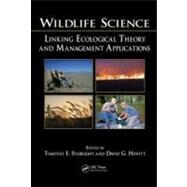- ISBN: 9780849374876 | 0849374871
- Cover: Hardcover
- Copyright: 6/20/2007
Consciously or not, wildlife managers generally act from a theoretical basis, although they may not be fully versed in the details or ramifications of that theory. In practice, the predictions of the practitioners sometimes prove more accurate than those of the theoreticians. Practitioners and theoreticians need to work together, but this proves difficult when new management ideas and cutting-edge ecological theory are often published in separate scientific outlets with distinctly different readerships.A compilation of the scientific papers presented at the Caesar Kleberg Wildlife Research Institute's 25th Anniversary Conference of April 2006, Wildlife Science: Linking Ecological Theory and Management Applications brings together these two often separate approaches to elucidate the theoretical underpinnings of wildlife management and to apply evolving ecological concepts to changes and adaptations in management practices. Gathering many of the best and greatest minds in wildlife science, this volume addresses the critically important theme of linking ecological theory and management applications. Divided into five parts, the first two parts deal with the landscape ecology of birds and mammals respectively, demonstrating the need for applied theory in gamebird management and the preservation of the cougar. Part three highlights the role of climate when applying ecological theory to habitat management and discusses the emergence of ecosystem management in managing wildlife at the ecosystem scale. Part fourconsiders the management of wildlife disease and reveals the increasing importance of genetics in conservation and ecology. Finally, the economic and social issues affecting wildlife science round out the coverage in part five.Applying emerging ecological theory for the advancement of wildlife management, Wildlife Science: Linking Ecological Theory and Management Applications provides a long awaited cooperative look at the future of ecosystem management.







